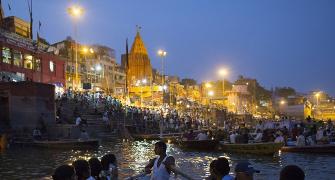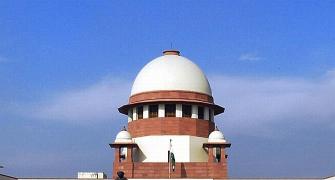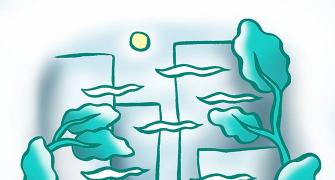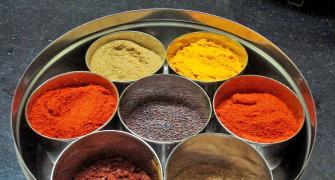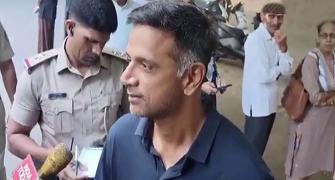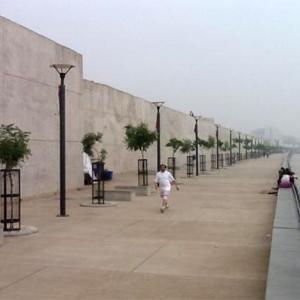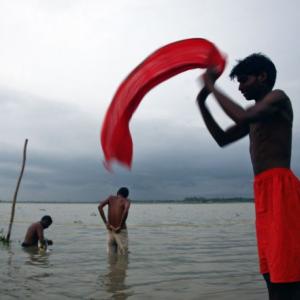Every river is a 'living person', argues Gopal Krishna on the basis of the recent Uttarakhand HC verdict.

On March 20, drawing on previous judgments -- in Yogendra Nath Naskar vs Commission of Income-Tax, Calcutta, 1969; Moorti Shree Behari ji vs Prem Dass, 1972; Ram Jankijee Deities vs State of Bihar, 1999; Shiromani Gurudwara Prabhandak Committee, Amritsar vs Shri Som Nath Dass, 2000 -- and Corpus Juris Secundum, Vol VI & Vol LXV; Salmond on Jurisprudence; A Textbook of Jurisprudence by Paton and analytical and historical jurisprudence, Justice Rajiv Sharma and Justice Alok Singh of the Uttarakhand high court concluded that 'we may… define a person for the purpose of jurisprudence as any entity (not necessarily a human being) to which rights or duties may be attributed'.
Following this inference, the division bench gave a landmark verdict in Mohd Salim v State of Uttarakhand & others, wherein it observed that that ‘to protect the recognition and the faith of society, rivers Ganga and Yamuna are required to be declared as the legal persons/living persons'.
The court noted that 'the extraordinary situation has arisen since rivers Ganga and Yamuna are losing their very existence. This situation requires extraordinary measures to be taken to preserve and conserve rivers Ganga and Yamuna'.
The 12-page verdict observes, 'The rivers have provided both physical and spiritual sustenance to all of us from time immemorial. Rivers Ganga and Yamuna have spiritual and physical sustenance. They support and assist both the life and natural resources and health and well-being of the entire community. Rivers Ganga and Yamuna are breathing, living and sustaining the communities from mountains to sea (sic).'
The judgment reads further, 'The advocate general shall represent at all legal proceedings to protect the interest of rivers Ganges (sic) and Yamuna.'
It said, 'Accordingly, while exercising the parens patriae jurisdiction, the rivers Ganga and Yamuna, all their tributaries, streams, every natural water flowing with flow continuously or intermittently of these rivers, are declared as juristic/legal persons/living entities having the status of a legal person with all corresponding rights, duties and liabilities of a living person in order to preserve and conserve river Ganga and Yamuna.'
'The director Namami Gange, the chief secretary of the state of Uttarakhand and the advocate general of the state of Uttarakhand are hereby declared persons in loco parentis as the human face to protect, conserve and preserve rivers Ganga and Yamuna and their tributaries. These officers are bound to uphold the status of rivers Ganges (sic) and Yamuna and also to promote the health and well being of these rivers,' it said.
It states that ‘there is utmost expediency to give legal status as a living person/legal entity to rivers Ganga and Yamuna r/w Articles48-A and 51A(g) of the Constitution of India’.
It emerges from this verdict that all rivers are juristic/legal persons/living entities. By implication this must extend even to all the water bodies and other creatures of nature.
While the order has done something which should have been done long ago, its observation on the petition saying ‘rivers Ganga and Yamuna are worshipped by Hindus. These rivers are very sacred and revered’ merits attention.
It states: 'The Hindus have a deep spiritual connection with rivers Ganges (sic) and Yamuna. According to Hindu beliefs, a dip in river Ganga can wash away all the sins. The Ganga is also called ‘Ganga Maa’. It finds mentioned in ancient Hindu scriptures including Rigveda.'
The fact, however, is that since time immemorial, Indians have worshipped rivers like Ganga, even before the word ‘Hindu’ was coined. The petition of Mohd Salim demonstrates that Ganga is revered by all the inhabitants of India irrespective of their faith.
Nevertheless, the verdict observes, 'All the Hindus have deep astha in rivers Ganga and Yamuna and they collectively connect with these rivers. Rivers Ganga and Yamuna are central to the existence of half of Indian population and their health and wellbeing.'
'The rivers have provided both physical and spiritual sustenance to all of us from time immemorial. Rivers Ganga and Yamuna have spiritual and physical sustenance. They support and assist both the life and natural resources and health and well-being of the entire community,' it said.
The fact is that rivers like Ganga and Yamuna are central to the existence of the entire population of the Indian subcontinent ‘from mountains to sea’ for their health and wellbeing.
It will be appropriate for the proposed amendment in the Inter-state River Water Disputes Act, 1956, to incorporate the essence of the verdict in the definition of ‘water dispute’.
At present, it remains confined to dispute or difference between two or more state governments. The Inter-State River Water Disputes (Amendment) Bill, 2017 faces a logical compulsion to widen the scope of parties to the dispute.
The bill is only about having only one tribunal and multiple benches instead of multiple tribunals (currently there are eight) as has been the case so far.
The two other important proposals are: Prior to referring the matter to the tribunal there is a provision of a dispute resolution committee; and, a time limit of four-and-a-half years for tribunal’s award.
It is saddening to note that the bill refers to ‘river basin’ but continues to treat river as a pipeline of water.
On the other hand, it is quite evident that the HC verdict makes rivers a party to every treaty, negotiation and dispute.
It also creates a rationale for abandoning the diversion of ‘interlinking of rivers’ project and for denial of clearance to Ken-Betwa component of this project.

